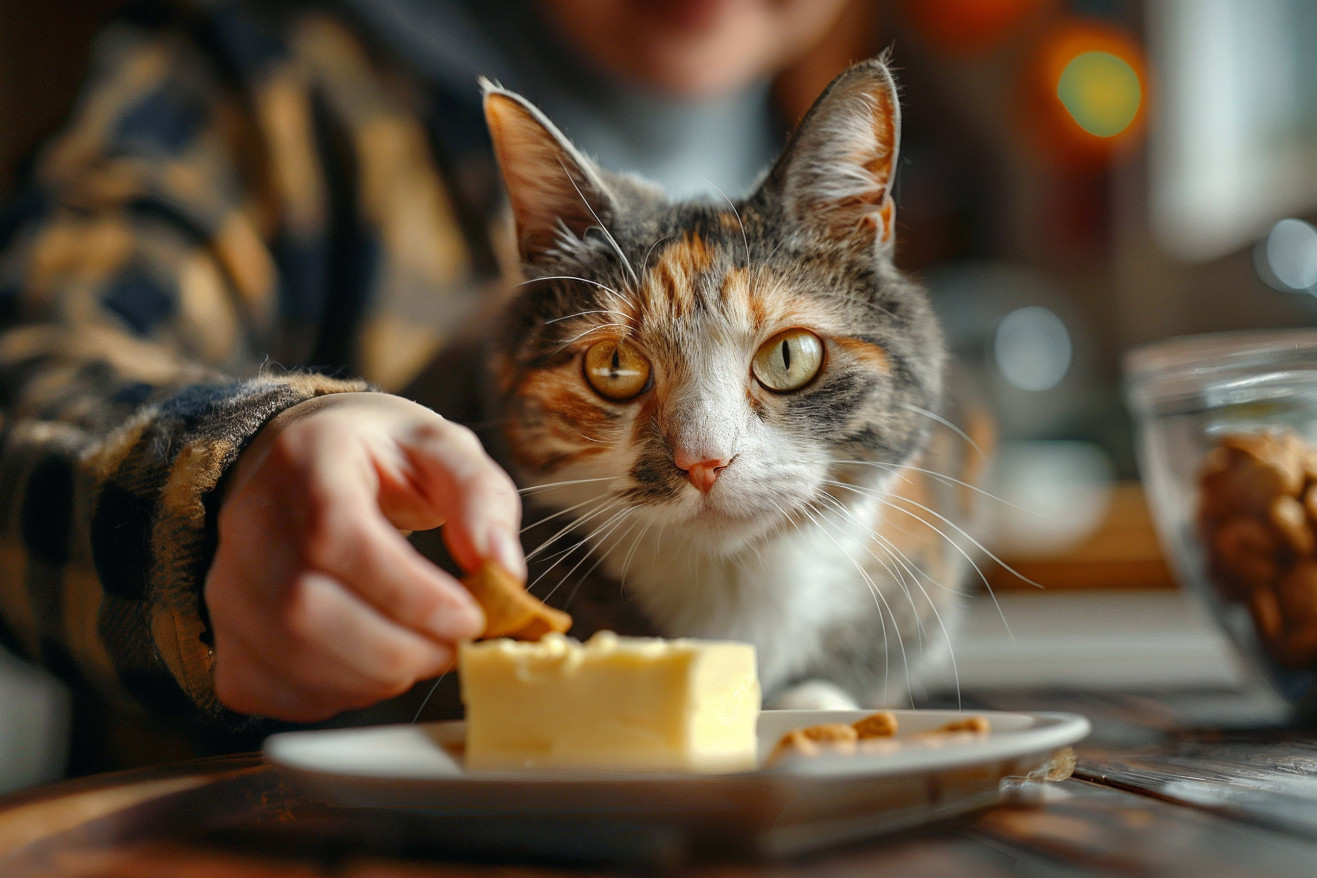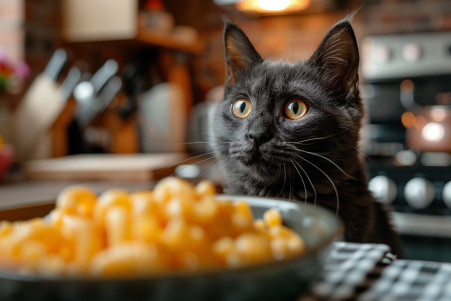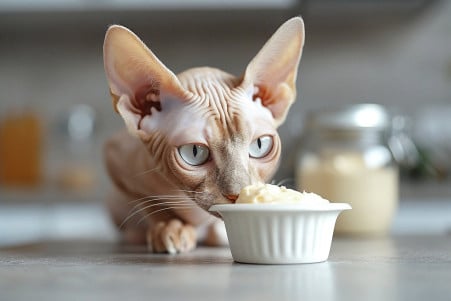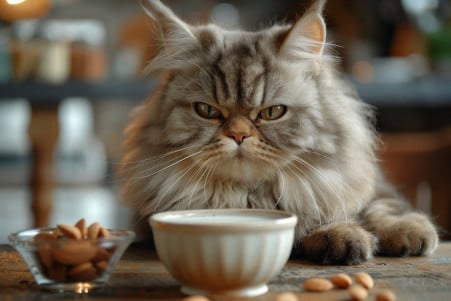Can Cats Eat Butter? Nutritional Guidance for Feline Diets
17 February 2024 • Updated 16 February 2024

Butter is a common ingredient in many human diets, but its role in feline nutrition is a bit more complicated. Technically, cats can eat butter, but veterinarians and animal nutrition experts discourage it because of its high fat content and potential to cause gastrointestinal upset. That said, cats can probably handle the occasional small amount of butter, but it has no nutritional value and can lead to obesity and other health issues in cats.
This article will explore the latest research in veterinary medicine and animal nutrition to help you understand the impact of butter on your cat’s diet. We’ll look at research on feline digestion, the effects of high-fat diets on cats, and the nutrients that cats need to be healthy. Our goal is to give you the information you need to make evidence-based decisions about what to feed your cat.
Can cats eat butter?
Basics of Feline Nutrition: What Cats Need From Their Diet
Cats are obligate carnivores, which means that their nutritional needs are different from those of other animals. Their diet should be rich in proteins, essential fatty acids, and amino acids, all of which are essential to their health and well-being.
According to the Cornell University College of Veterinary Medicine, a healthy diet for cats should be high in protein, moderate in fat, and low in carbohydrates. These requirements are based on the nutrients that cats can only get from animal products.
Fats are an important part of a cat’s diet because they provide energy and help with the absorption of fat-soluble vitamins. However, not all fats are created equal. The Purina Institute explains that cats require nutrients like arachidonic acid and omega-3 fatty acids, which are not present in plant tissues and are necessary for their well-being.
Commercial cat foods are carefully formulated to meet these nutritional needs. The Feline Nutrition Expert Subcommittee of the Association of American Feed Control Officials (AAFCO) sets the nutritional guidelines that cat food manufacturers must follow to make sure their products are complete and balanced.
As the VCA Animal Hospitals explains, animal-source ingredients should be listed among the first few ingredients on the label to make sure the food contains the essential amino acids and fatty acids that cats need.
Knowing these nutritional basics helps explain why certain foods, especially those high in non-essential fats, may not be the best choice for cats, and why it’s so important to make sure their diet is high-quality and balanced.
Health Risks of High-Fat Diets in Cats
The consumption of high-fat foods, including butter, by cats can have several negative health effects. A study published in PubMed found that feeding cats a high-fat diet resulted in an increase in plasma triglycerides and cholesterol, both of which can lead to obesity and heart disease when they reach high levels.
In addition, the high-fat diet led to a decrease in the insulin response in the cats, which may lead to impaired glucose tolerance and diabetes mellitus, a serious condition in cats.
In addition to these metabolic effects, a study published in PubMed looked at the clinical responses of cats with chronic diarrhea to diets with different fat contents. While the study didn’t specifically look at the effects of butter, it did show the importance of fat in a cat’s diet when it comes to their digestive health.
In this case, the high-fat diets didn’t help the cats, which shows how important it is to manage a cat’s diet when they have chronic health conditions.
Another study in BMC Veterinary Research delves into the connection between a cat’s diet and their health. This study looked at the metabolic responses of cats to different diets and found that cats that are prone to obesity may regain insulin sensitivity after losing weight, which shows how important a cat’s diet, including the amount of fat they consume, is to their health.
Clearly, high-fat diets, including those that include butter, can lead to a number of health issues in cats, from metabolic problems to digestive concerns, which shows how important it is to keep these risks in mind when choosing your cat’s food.
How Cats Digest Food: Fat Digestion in Cats
The feline digestive system has evolved to process the high-protein, moderate-fat diet that is characteristic of a carnivorous diet. Carnivore-specific enzymes, including pancreatic lipase, are essential for breaking down fats so that they can be absorbed and used by the body.
However, fat digestion in cats is impacted by age. A study published in PMC showed that fat digestibility decreases in older cats, which is associated with lower serum cobalamin concentrations, a marker of gastrointestinal health.
Other studies have shown that fat digestibility can be impacted by chronic pancreatitis or subclinical gastrointestinal diseases, both of which are common in older cats. As cats age, they are more likely to develop these conditions, which could lead to a significant decrease in the efficiency of fat digestion. In addition, high-fat foods like butter can overwhelm the digestive system, making these issues worse and leading to decreased fat absorption and potential digestive issues.
In light of these studies, it’s clear that while dietary fat is important for cats, especially those in the later stages of life, the type and amount of fat in their diet needs to be carefully controlled. Making sure that cats get the right kind of fats in their diet is essential to their overall health and well-being.
Essential Fatty Acids Are Important for Cats
Although it’s obvious that cats should not eat high-fat foods like butter, it’s important to note that some fats are important for cats.
According to PetMD, cats need essential fatty acids like linoleic acid and arachidonic acid, which are omega-6 fatty acids that are important for cell membrane structure and function, hormone synthesis, and skin and coat health. Omega-3 fatty acids, including eicosapentaenoic acid (EPA) and docosahexaenoic acid (DHA), are also important for brain function and can help lower inflammation.
In fact, researchers, as cited in a study published in PMC, studied the impact of dietary manipulation of arachidonic acid (ARA) and EPA/DHA on circulating lipids and metabolites in cats and found that increasing dietary omega-3s led to positive changes, including lower cholesterol levels. This shows that certain fats, which are not present in butter, since it’s mostly made up of saturated fats, are important for cats.
In addition, the Clinical Nutrition Service at the Cummings School notes that a proper balance of omega-6 and omega-3 fatty acids is important for overall health and warns that too much of either can be harmful. Fatty acids from fish oil and other sources are better than those from butter because they are associated with better health outcomes for cats, especially for diseases that involve inflammation.
Knowing this, it’s important for cat owners to make sure they are feeding their pets a well-balanced diet that meets their specific nutritional needs.
Customizing Cat Diets: How to Manage Fat Intake in Cats
Managing the amount of fat in your cat’s diet is important for their overall well-being. As Vet Help Direct explains, cats need a moderate amount of fat to supply them with energy, and essential fatty acids are important in the prevention and treatment of disease.
To make sure your cat gets the right kinds of fats, replace butter-based treats with options that are high in omega-3 and omega-6 fatty acids, such as small amounts of cooked fish or treats that are recommended by a vet.
If you’re switching your cat from a diet that included butter or other high-fat foods, it’s best to gradually introduce the new, healthier options while slowly decreasing the amounts of the less healthy ones. This will help prevent stomach upset and give your cat time to adjust to the new tastes and textures.
It’s also important to remember that every cat is different. As the RSPCA points out, it’s important to consider your cat’s age, health, and activity level when you’re planning their diet. Regular visits to the vet can help you get personalized advice that will help you make sure your pet gets the nutrients they need without the risks that come with high-fat foods like butter.
This will also help you make sure that your cat’s diet is well-balanced, which is important for their overall health and well-being.
Final Thoughts on Cats, Cat Diets, and Butter
As we’ve delved into the world of cat nutrition, it’s become increasingly obvious that butter is not a good fit for cats.
While not toxic, butter’s high calorie count and lack of essential nutrients mean that it’s not a good idea to feed it to cats on a regular basis.
Cats are obligate carnivores, which means that they need a diet that’s high in protein and includes the kinds of fats that are not present in butter. Feeding cats butter can lead to too many calories and potential health problems like obesity, pancreatitis, and other metabolic issues as noted by Catster and PetMD.
Knowing what cats need nutritionally is essential to their health and well-being. It’s up to us as pet parents to make sure that we’re feeding our cats a balanced, species-appropriate diet that meets their unique evolutionary needs, complies with the Association of American Feed Control Officials’ standards, and doesn’t include human foods that can throw this balance off.
So, while a small taste of butter may not be immediately dangerous, it’s important to make sure that we prioritize a nutritionally complete diet for our cats so that they can live long, healthy lives.


